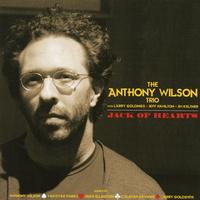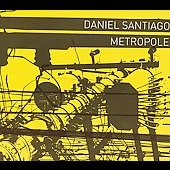Home » Jazz Articles » Multiple Reviews » This Ain't No Ukelele: Jazz Guitarists Anthony Wilson, D...
This Ain't No Ukelele: Jazz Guitarists Anthony Wilson, Daniel Santiago and John Pondel
It has also been reported that the guitar gives its owner the power of attraction over the opposite sex. Well, with each new sale lost to a gaming console or a cellphone, the relevance of this suggestion has waned more and more as time goes by. And, if the ability to thrum but a few chords ever had such subliminal power, one must concur with Bob Dylan that the times they are indeed a-changin.' This raises concerns. Has music lost the youth's interests? Are the new, digital products of the entertainment and communications industries that much more appealing?
Take for example Jimi Hendrix and Pete Townsend. In their hands, the instrument was often used as an object of spectacle. Then with Eddie Van Halen and Steve Vai it became more pyrotechnic. Yet, in the hands of acoustic players like Egberto Gismonti, Michael Hedges or John Renbourn, among others, it took on a powerful—if quieter—role. The instrument has undergone an impressive development in the jazz world as well. From Eddie Lang, Django Reinhardt and Charlie Christian, to Eivind Aarset and Wayne Krantz, it appears a different instrument altogether. In fact, since Jim Hall, the six-string guitar acquired a stylized, more introspective temperament, which effected the slew of players who were to follow.
Each in his own way, Anthony Wilson, Daniel Santiago and John Pondel represent the wide variety of styles going under the generic term "jazz guitar."
 Anthony Wilson Trio
Anthony Wilson Trio
Jack Of Hearts
Groove Note Records
2009
A neo-traditionalist in the same vein as Mark Whitfield and Russell Malone, Anthony Wilson is not one to shrug off his instrument's blues roots or long history as a tool of groove. As a matter of fact, when he is not busy laying it down behind jazz diva Diana Krall, Wilson is often found in the studio supporting other chart-topping acts like Chris Botti, Michael Buble, and Queen Latifah. A groovy, jazz-meets-pop-meets-funk affair, his Jack Of Hearts appears like a hidden card he is been itching to pull from his sleeve. Organist Larry Goldings and top-notch session drummers Jeff Hamilton and Jim Keltner are there to ensure his is a winning hand.
At times reminiscent of Wes Montgomery's debut for Prestige with Melvin Rhyne, at others of Grant Green's soul-jazz sessions, Wilson happily opens up the somewhat stigmatized format to some crossover imports. As the spirit of down-home blues, re-arranged pop tunes and B3-brindled ballads mixes in amicably with the organ-trio idiom, this approach—though arguably less exciting than most "standard" organ trios - should appeal more to casual listeners than to die-hard jazz fans. The latter will most likely find the presence of that idiomatic, pumped-on-testosterone feel such units carry more contained here. It is. But, whether Wilson's approach is original or not is besides the point. What is of importance is whether he and his acolytes can impart the fun they have making this music. From the get go, with the opening track "Mezcal," it is unquestionably evident these guys had a blast making this recording.
 Daniel Santiago
Daniel Santiago
Metropole
Adventure Music
2009
Daniel Santiago is also not one to take the fun out of playing the guitar, quite the contrary. Hailing from Brazil, Santiago favours a collegial approach to composition, putting his sizzling melodies through a dangerously nervous rhythmic machine and then toning it down to acoustic-set, pastoral vistas. But, as its title suggests, the idea behind Metropole is of conjuring up a bustling urban landscape, of vertically stacked harmonic-rhythmic structures with reserved pathways for zigzagging soloists. The listener comes out of the excursion alive, and longing for more.
A skilled technician and composer, Santiago shares conceptions of phrasing and tone with Pat Metheny. His winning tandem with saxophonist Josue Lopez is reminiscent of the Brazil-bound master's collaborations with saxophonist Michael Brecker. "Traveling" and "Miracle are two telling examples. His pensive "Children Of The War" calls to meditation in much the same way that Metheny's "Message To A Friend" did on the Beyond The Missouri Sky (Verve, 1997) project with bassist Charlie Haden. That said, this second outing reveals Santiago as a talented, maturing voice whose influences, though watermarked, are rapidly overlooked for the superior quality of its presentation. A name to reckon with.
 John Pondel
John Pondel
John Pondel
Real Guy Productions
2009
Active on the West Coast scene since his early twenties, it is surprising John Pondel has taken so long to come out with his first effort as a leader. A sophisticated, harmonic player a la Lenny Breau, Joe Diorio and Ted Greene, Pondel has played alongside trumpeter Snooky Young and saxophonist Harold Land in the Grammy-winning Gerald Wilson Orchestra (led by the other, above-mentioned Wilson's father). He also co-leads acid-jazz pioneer unit Jazzhole with vocalist Marlon Saunders and keyboardist-producer Warren Rosenstein.
An elegant and classy stylist straight out of the Jim Hall tradition, Pondel, like his elder, has adopted effects to tinker the sound of his hollow-body guitar. Whereas Hall uses effects to harmonize single note lines with intervals otherwise unplayable or too taxing, Pondel's stomp box lowers the pitch of his phrases' last notes, thus producing microtonal glissandi ("reverse bends" in guitar terminology). When used too frequently—such as in the otherwise acceptable take of Horace Silver's "The Jody Grind"—the gimmick becomes irritating. Considering Pondel's broad knowledge of voicings and textures, his reliance on such an aid appears unnecessary. In fact, his chording amply colors the sonic space, which remains austere with only percussionist Marivaldo Dos Santos, bassist Scott Colley and guest flautist/saxophonist David Binney filling in the backdrop. Such parred down instrumentation becomes an issue in the overall dynamics the trio project.
In this sense, the decision to feature Binney on flute—rather than saxophone—on two of his three appearances appears questionable. So is the selection of Dos Santos instead of a full-set drummer; his assortment of shells, drums and sonorous cymbals unfortunately does little to fill the sterile sonic landscape. Always solid, Colley claims the strongest voice here, which is especially manifest in his spirited soloing on "Jakes Dilemma" and "Waving Not Drowning," a cajoling composition despite its title. But, all things considered, Pondel's debut is a disappointing affair, especially considering the load of experience he brings to the table.
Docile or impudent, the electric guitar does have the power to paint many moods. In the right hands, such as the three practitioners above, its status in the jazz world is to be championed, with each new player coming and shaking its contentions anew. Let us hope many more of those are waiting in the wings.
Tracks and Personnel
Jack Of Hearts
Tracks: Mezcal; Jack of Hearts; Hawkeyes; Carnegie Blues; Theme from Chinatown; Vida Perdida Acabou; Orange Crate Art; Harajuku; Zweet Zursday; Homecoming.
Personnel: Anthony Wilson: guitar; Jim Keltner: drums (1, 5, 7, 8, 10); Jeff Hamilton: drums (2-4, 9); Larry Goldings: Hammond B-3 organ, celeste.
Metropole
Tracks: Old City; In The Rain; Gregorian Samba; Letter To The World; Children of the War; Salamandra; Traveling; Lagoon; Angola's Dance; Miracle; Within Us; Metropole.
Personnel: Daniel Santiago: guitars; Josue Lopez: tenor and soprano saxophone; Vitor Goncalves: piano; Marcio Bahia: drums (4, 5, 7, 9, 11, 12); Edu Ribeiro: drums (1-3, 6, 8, 10); Guto Wirtti: bass.
John Pondel
Tracks: Make It Nice; Jakes Dilemma; Mr. Obvious; HP; Waving Not Drowning; Where the River Ends; The Jody Grind; Ed Snipe.
Personnel: John Pondel: guitar; Scott Colley: bass; Marivaldo Dos Santos: percussion; David Binney: flute & alto saxophone.
< Previous
Esopus Opus
Next >
Detour Ahead
Comments
Tags
For the Love of Jazz
 All About Jazz has been a pillar of jazz since 1995, championing it as an art form and, more importantly, supporting the musicians who create it. Our enduring commitment has made "AAJ" one of the most culturally important websites of its kind, read by hundreds of thousands of fans, musicians and industry figures every month.
All About Jazz has been a pillar of jazz since 1995, championing it as an art form and, more importantly, supporting the musicians who create it. Our enduring commitment has made "AAJ" one of the most culturally important websites of its kind, read by hundreds of thousands of fans, musicians and industry figures every month.

















